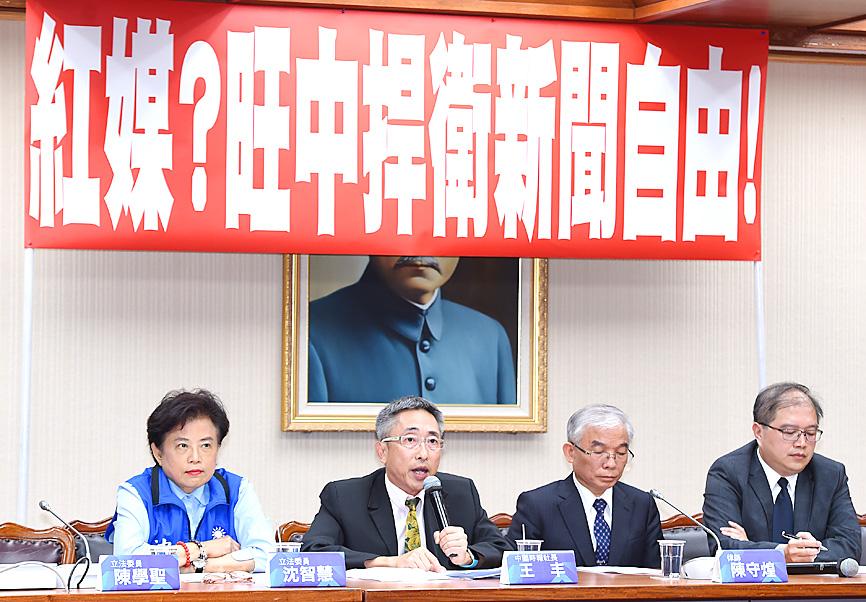The Taipei District Prosecutors’ Office yesterday announced that it has dropped defamation cases against the Financial Times, Central News Agency (CNA) president Chang Jui-chang (張瑞昌) and others after Want Want China Times Media Group (旺旺中時集團) suddenly rescinded its lawsuits.
The group in 2019 filed a lawsuit against the London-based newspaper, the state-run news agency and two others over a July 17, 2019, report by Financial Times reporter Kathrin Hille.
In the article, Hille quoted anonymous journalists at Want Want-owned media outlets the China Times and CtiTV (中天電視) as saying that editorial staff took daily orders from China’s Taiwan Affairs Office on how to handle news relating to cross-strait affairs and China.

Photo: Liao Chen-huei, Taipei Times
CNA and other news outlets subsequently quoted the article, drawing ire from the group and a vow to sue for slander all that cited the report.
Lawyer Chen Shou-huang (陳守煌), who at the time represented Want Want in announcing the lawsuits, yesterday said that he no longer works for the conglomerate and did not know about the decision or the reasoning behind it.
Hille during questioning provided her handwritten notes from interviews as evidence and attested that she fulfilled her obligation to verify information before publication.
However, she declined to reveal the identities of her sources, citing her duty to protect them.
Earlier this year while the office was investigating the case, Want Want abruptly rescinded its lawsuits, the office said.
Since defamation suits in Taiwan require a complaint by a victim, investigators decided to end their probe, it said.

The Central Election Commission has amended election and recall regulations to require elected office candidates to provide proof that they have no Chinese citizenship, a Cabinet report said. The commission on Oct. 29 last year revised the Measures for the Permission of Family-based Residence, Long-term Residence and Settlement of People from the Mainland Area in the Taiwan Area (大陸地區人民在台灣地區依親居留長期居留或定居許可辦法), the Executive Yuan said in a report it submitted to the legislature for review. The revision requires Chinese citizens applying for permanent residency to submit notarial documents showing that they have lost their Chinese household record and have renounced — or have never

A magnitude 5.6 earthquake struck off the coast of Yilan County at 12:37pm today, with clear shaking felt across much of northern Taiwan. There were no immediate reports of damage. The epicenter of the quake was 16.9km east-southeast of Yilan County Hall offshore at a depth of 66.8km, Central Weather Administration (CWA) data showed. The maximum intensity registered at a 4 in Yilan County’s Nanao Township (南澳) on Taiwan’s seven-tier scale. Other parts of Yilan, as well as certain areas of Hualien County, Taipei, New Taipei City, Taoyuan, Hsinchu County, Taichung and Miaoli County, recorded intensities of 3. Residents of Yilan County and Taipei received

Taiwan has secured another breakthrough in fruit exports, with jujubes, dragon fruit and lychees approved for shipment to the EU, the Ministry of Agriculture said yesterday. The Animal and Plant Health Inspection Agency on Thursday received formal notification of the approval from the EU, the ministry said, adding that the decision was expected to expand Taiwanese fruit producers’ access to high-end European markets. Taiwan exported 126 tonnes of lychees last year, valued at US$1.48 million, with Japan accounting for 102 tonnes. Other export destinations included New Zealand, Hong Kong, the US and Australia, ministry data showed. Jujube exports totaled 103 tonnes, valued at

BIG SPENDERS: Foreign investors bought the most Taiwan equities since 2005, signaling confidence that an AI boom would continue to benefit chipmakers Taiwan Semiconductor Manufacturing Co’s (TSMC, 台積電) market capitalization swelled to US$2 trillion for the first time following a 4.25 percent rally in its American depositary receipts (ADR) overnight, putting the world’s biggest contract chipmaker sixth on the list of the world’s biggest companies by market capitalization, just behind Amazon.com Inc. The site CompaniesMarketcap.com ranked TSMC ahead of Saudi Aramco and Meta Platforms Inc. The Taiwanese company’s ADRs on Tuesday surged to US$385.75 on the New York Stock Exchange, as strong demand for artificial intelligence (AI) applications led to chip supply constraints and boost revenue growth to record-breaking levels. Each TSMC ADR represents